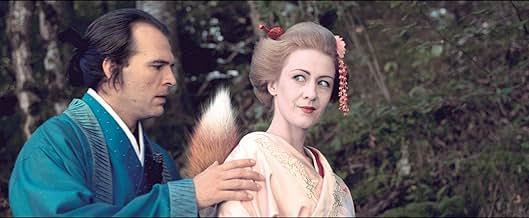This movie starts like a fairy-tale, and retains this style throughout: Liza is a simple young (well, she's hitting 30) girl who hasn't found her dream prince yet. She's working in a fictional Budapest as a live-in nurse for an elderly lady, who teaches her Japanese because she used to be the wife of the Japanese ambassador. Did I mention that it's a very complex fairy tale? Simple Liza reads her favourite Japanese novel over and over, listens to J-Pop and dreams about meeting her prince over a crab burger, just like in the novel. One day, a Japanese pop star from the Sixties appears to her, and they both shake it out. Liza manages to get two hours off to go to a burger joint, which is the closest thing to the crab burger joint of her dreams. While she's gone, her ward dies, killed by the only seemingly innocuous spirit of a Japanese pop singer, Tomy Tano. Liza inherits the flat, but the evil spirit is now jealous of her quest for a dream lover. Many good men, and some mediocre ones, die, and Liza's only explanation for this is that she is a fox-fairy, a Japanese mythological figure of a young, attractive woman who is inevitably killing off all of her suitors ...
This is a very odd, very complex and very well made movie in the style of Le fabuleux destin d'Amélie Poulain about a young woman finding happiness. I especially enjoyed the subcosmos of equally erstwhile as well as fictional J-pop star Tomy Tano, he seemed to be living in an eternally hip and fun world of great tunes and swinging moves.























